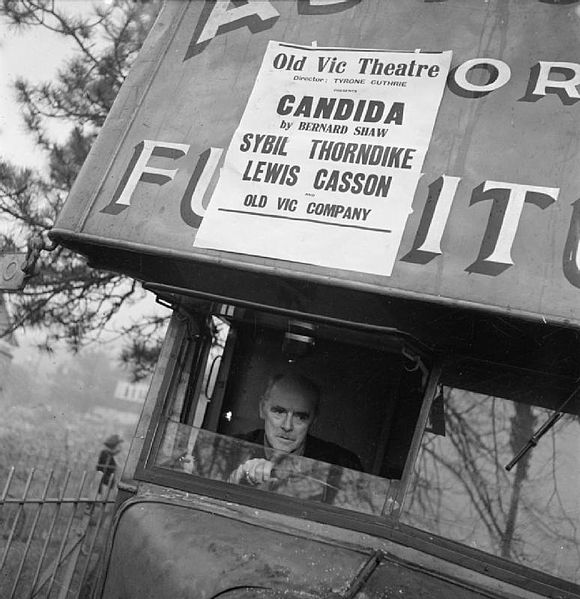Candida, a comedy by playwright George Bernard Shaw, was written in 1894 and first published in 1898, as part of his Plays Pleasant. The central characters are clergyman James Morell, his wife Candida and a youthful poet, Eugene Marchbanks, who tries to win Candida's affections. The play questions Victorian notions of love and marriage, asking what a woman really desires from her husband. The cleric is a Christian Socialist, allowing Shaw to weave political issues, current at the time, into the story.
Katharine Cornell and Pedro de Cordoba in the 1924 Broadway production of Candida
A scene from a production of the play in Berlin
Actor Lewis Casson drives the Old Vic Travelling Theatre Company scenery van during the Old Vic tour of South Wales in 1941. The van is an old furniture removal van. A poster above the windscreen advertises the play they will be performing as Candida, starring Casson and Sybil Thorndike, and directed by Tyrone Guthrie.
George Bernard Shaw, known at his insistence as Bernard Shaw, was an Irish playwright, critic, polemicist and political activist. His influence on Western theatre, culture and politics extended from the 1880s to his death and beyond. He wrote more than sixty plays, including major works such as Man and Superman (1902), Pygmalion (1913) and Saint Joan (1923). With a range incorporating both contemporary satire and historical allegory, Shaw became the leading dramatist of his generation, and in 1925 was awarded the Nobel Prize in Literature.
Shaw in 1911, by Alvin Langdon Coburn
Shaw's birthplace (2012 photograph). The plaque reads "Bernard Shaw, author of many plays, was born in this house, 26 July 1856".
Shaw in 1879
William Archer, colleague and benefactor of Shaw







